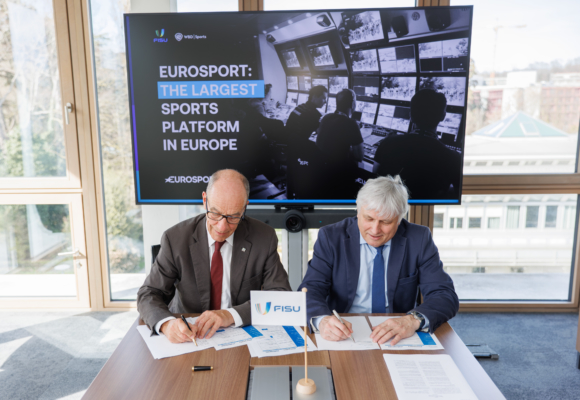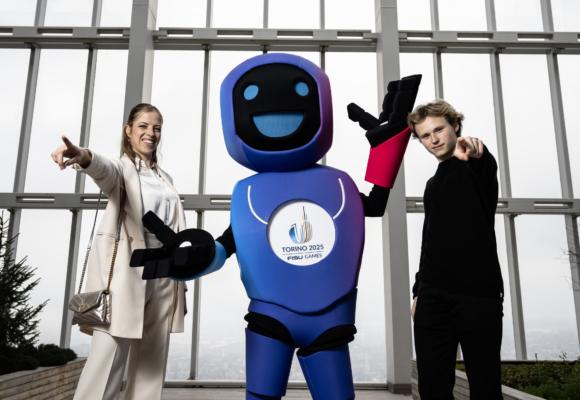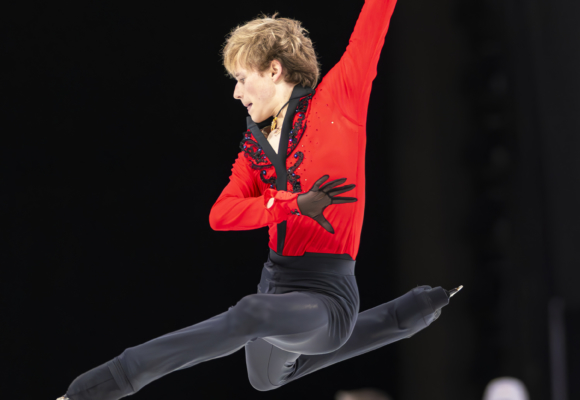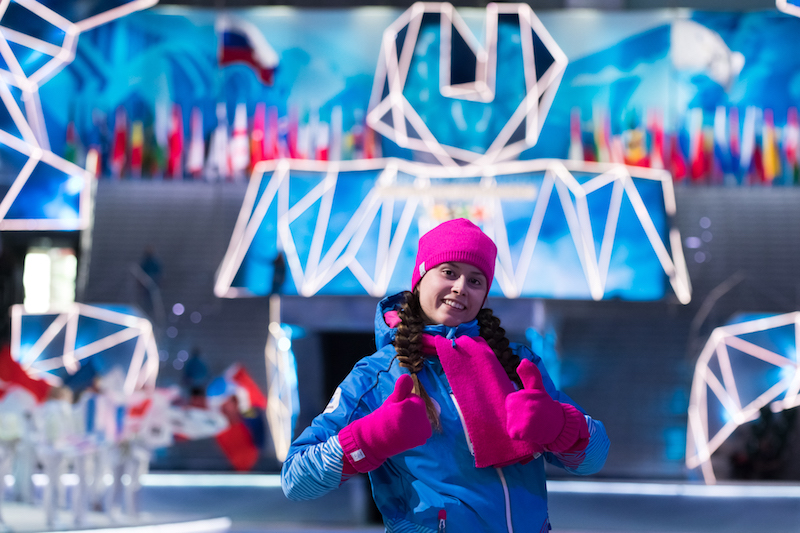 KRASNOYARSK, 12 March – When FISU President Oleg Matytsin said, “Krasnoyarsk has set new standards,” as the Winter Universiade 2019 cauldron was extinguished, he meant it in more ways than one.
KRASNOYARSK, 12 March – When FISU President Oleg Matytsin said, “Krasnoyarsk has set new standards,” as the Winter Universiade 2019 cauldron was extinguished, he meant it in more ways than one.
After eleven days of sport and culture, the 29thedition of the Winter Universiade came to a close in the heart of Siberia, having well and truly raised the bar – not only in grandiosity, although grand it was – but in details, numbers, the little facts that make all the difference.
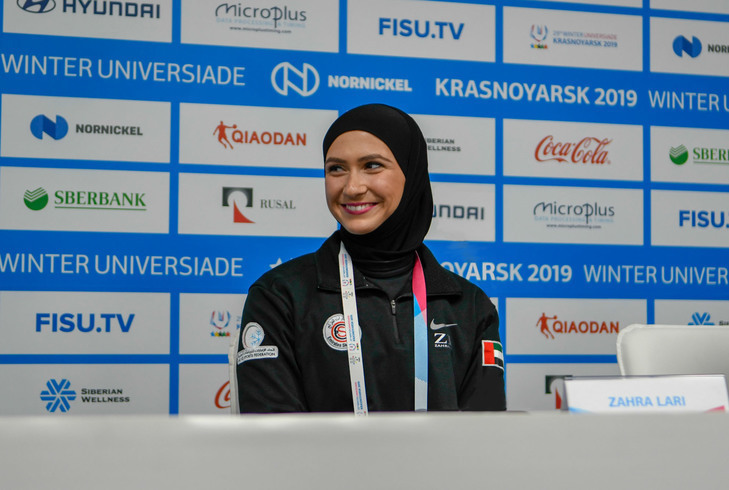 The participation of 58 countries with nearly 1700 athletes was in itself a new record for the Winter Universiade, but there were also many other firsts. The fascinating sport of Ski Orienteering made its Universiade debut, for example, and the United Arab Emirates participated in the winter sport spectacle for the first time. Zahra Lari, the country’s first international-level figure skater won hearts and accolades as she performed with grace in her hijab.
The participation of 58 countries with nearly 1700 athletes was in itself a new record for the Winter Universiade, but there were also many other firsts. The fascinating sport of Ski Orienteering made its Universiade debut, for example, and the United Arab Emirates participated in the winter sport spectacle for the first time. Zahra Lari, the country’s first international-level figure skater won hearts and accolades as she performed with grace in her hijab.
The tone was set right from day one, when cosmonaut Oleg Kononenko spoke to the athletes from outer space during the opening ceremony. Right then, hope and hype for Krasnoyarsk 2019 couldn’t have been much higher. By the time the 76 medal events came to a fitting end, the Winter Universiade and student sport itself were touching new heights.
Each day of competition produced moments of glory and ecstasy that captured the imagination of the spectators and media alike. Some moments though, stood out from the rest. During the immensely popular figure skating competition, there was a moment on the ice — and not in the kiss and cry area — that evoked true emotions of sport.
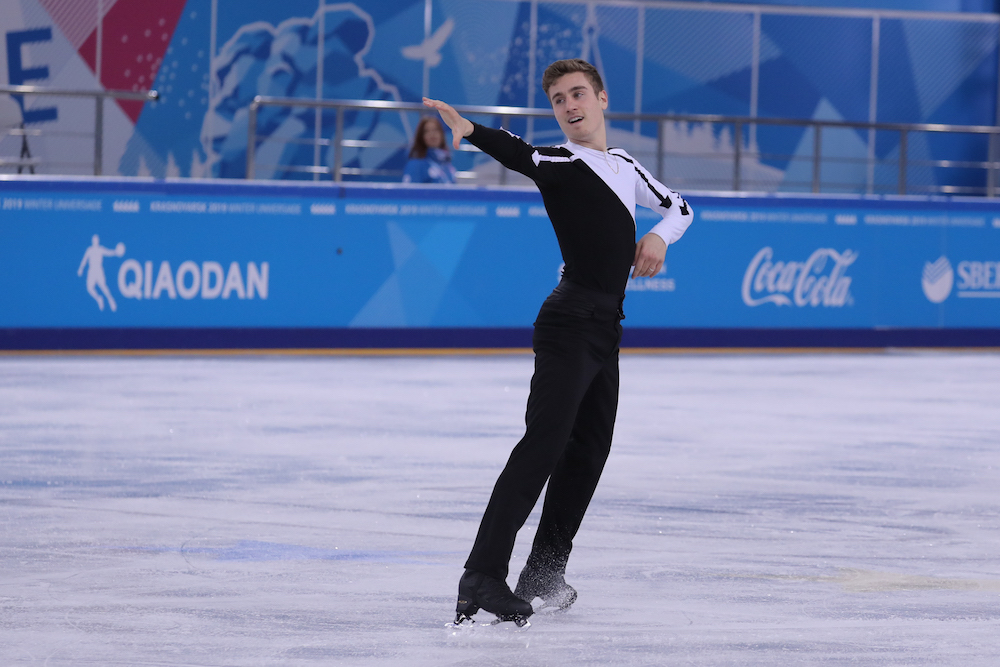 In the stands during the men’s free skate, you could feel the reverberations of the home crowd chanting, urging on the performance of local hero Maxin Kovtun. A short while later though, when Italy’s Matteo Rizzo performed a nearly flawless routine to a Queen medley, spectators were turning to one another and mouthing ‘wow’. His gold-medal winning performance captivated the audience and the cheer that rose from the crowd was worthy of the medal he’d earned.
In the stands during the men’s free skate, you could feel the reverberations of the home crowd chanting, urging on the performance of local hero Maxin Kovtun. A short while later though, when Italy’s Matteo Rizzo performed a nearly flawless routine to a Queen medley, spectators were turning to one another and mouthing ‘wow’. His gold-medal winning performance captivated the audience and the cheer that rose from the crowd was worthy of the medal he’d earned.
“The atmosphere of the Universiade is delightful,” said Rizzo, the 2019 European Figure Skating Championship bronze medallist, after his performance. “The way I skated, it perfectly matched the support I felt from the stands. The resulting atmosphere was unique and amazing.”
The crowd played no favourites for athletes in other arenas as well, giving their all, in support. This extended to the cross-country ski arena where the men’s Chinese relay team was met by a standing room only crowd, on its feet for a team crossing the finish line the better part of a half hour out of the medal hunt.
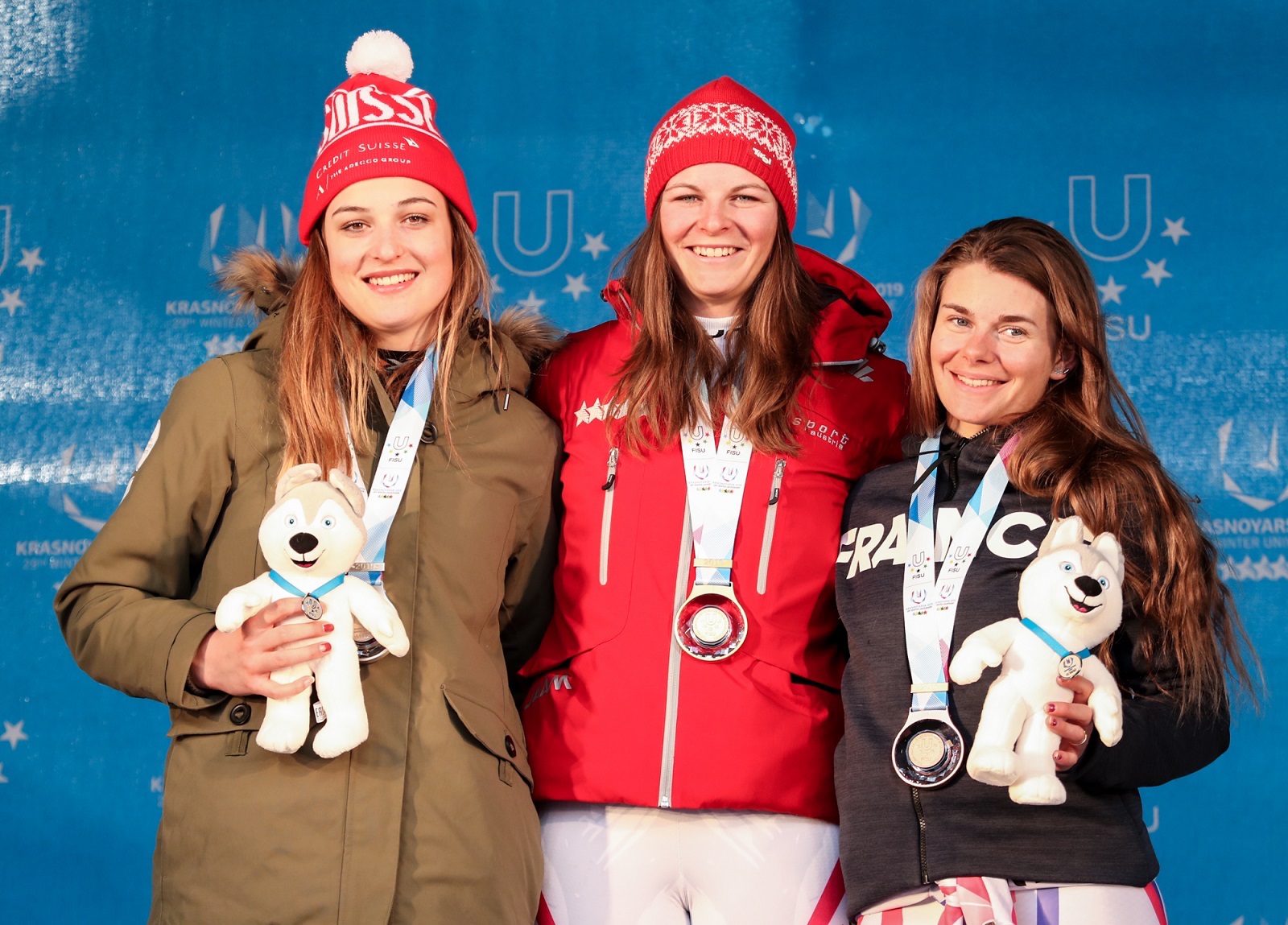 Some of the standout stars of the games were Russian Cross-Country skier Alisa Zhambalova, who swept up four gold medals – pretty much everything that was on offer. Her compatriot Ivan Yakimushkin too, won three gold medals in the men’s Cross-Country events. Korea’s Jiwon Park ruled Short Track Speed Skating with two gold and one bronze, while Austria’s Jessica Gfrerer was the standout Alpine Skier with three golds in the Super-G, Alpine Combined and the parallel nations mixed team event.
Some of the standout stars of the games were Russian Cross-Country skier Alisa Zhambalova, who swept up four gold medals – pretty much everything that was on offer. Her compatriot Ivan Yakimushkin too, won three gold medals in the men’s Cross-Country events. Korea’s Jiwon Park ruled Short Track Speed Skating with two gold and one bronze, while Austria’s Jessica Gfrerer was the standout Alpine Skier with three golds in the Super-G, Alpine Combined and the parallel nations mixed team event.
Featured for the second time in Winter Universiade history, this mixed team event proved to be a real hit with spectators and sportspersons alike. The competition format plays to the roots of university sports as both the male and female skiers play an equal role in the outcome – teams of two male and two female student-athletes compete together in a knock out format.
Gfrerer was all praise for the event and the entire Universiade experience. “This was my first time in Russia and I really liked it,” she said at the end of her golden campaign. “The conditions are very good, everything is just wonderful. I would like to commend the work of volunteers: they are polite and kind, they are always there to help you. I would recommend my friends to visit Russia at least once – to see for themselves how everything is here. The environment here is very friendly, it’s a wonderful atmosphere.”
With that, she summed up the spirit of the Winter Universiade. In the heart of Siberia, where there was a warmth and respect for a job well done that athletes, spectators and journalists intimately felt.
The Closing Ceremony of the Universiade captured the spirit perfectly too. Attended by Dmitry Medvedev, Prime Minister of the Russian Federation, the Ceremony began with a demonstration of the best moments of the games: the joy of victories, the agony of loss, the warm welcome to everyone by the locals.
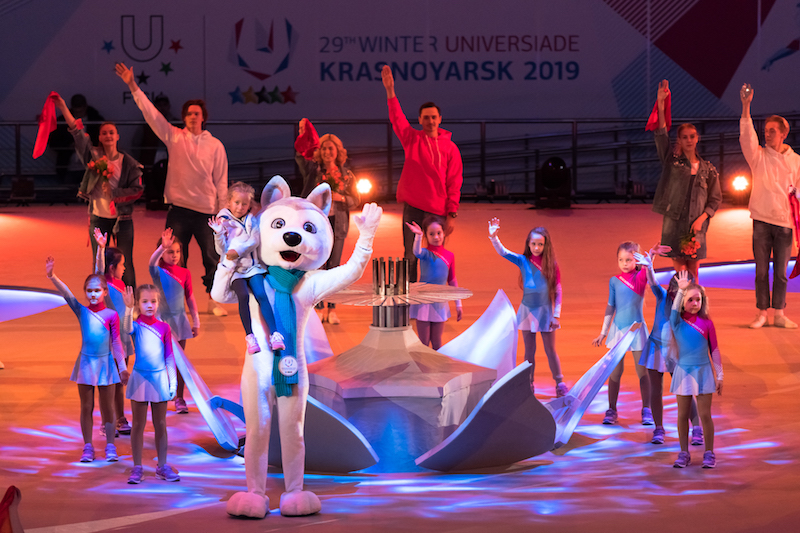 As had been the case with the spectacular Opening Ceremony, the presentation was a beautiful amalgamation of music, dance, culture and the nations’ parade.
As had been the case with the spectacular Opening Ceremony, the presentation was a beautiful amalgamation of music, dance, culture and the nations’ parade.
Prime Minister Medvedev addressed the participants and said, “We did everything to ensure our guests and all competitors felt the warmth and hospitality of Russia. Eleven unbelievable days passed full of powerful emotions. I would like to sincerely congratulate all the champions of the Winter Universiade 2019. The greatest victory is our common one: you proved one more time that the most important things in sport are generosity, courage, team spirit and commitment to the principles of fair play!”
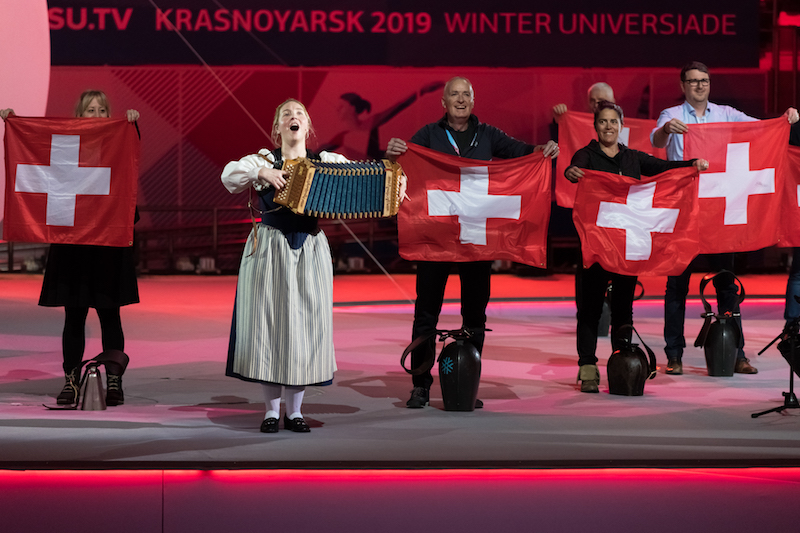 FISU President Oleg Matytsin thanked the people of Krasnoyarsk and said, “the days that we spent here, in the heart of Siberia, will always remain in our memory!”
FISU President Oleg Matytsin thanked the people of Krasnoyarsk and said, “the days that we spent here, in the heart of Siberia, will always remain in our memory!”
The FISU President and Sergey Eryomin, Mayor of Krasnoyarsk, then handed over the FISU flag to Beat Züsli, Mayor of the Swiss city of Lucerne that will host the next Winter Universiade in 2021.
As the flame of the 29th Winter Universiade was extinguished, the warmth and friendship of Siberia passes onto Lucerne 2021.
Spasibo Krasnoyarsk!


